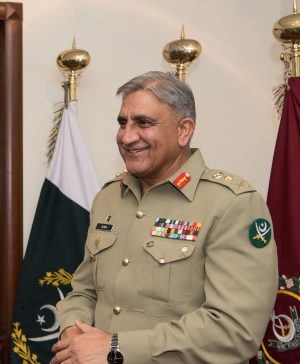When ex-premier Nawaz Sharif embarked on a road trip to his hometown Lahore soon after his sacking due to a controversial court case in November 2017, his goal was to stoke public sentiments in support of civilian supremacy.
Sharif’s party blamed the proverbial “hidden hand,” a euphemism referring to Pakistan’s intelligence agencies and the country’s military establishment, for his fall.
Within days, Sharif’s narrative of “Vote Ko Ezzat Do” or “respect the vote” was resounding in Pakistan’s mainland Punjab, the ex-premier’s main support base, raising the hope that the powerful military establishment could ultimately be challenged over its meddling in politics.
But Pakistan witnessed the deathblow to the nascent resistance movement spearheaded by Sharif and his charismatic daughter Maryam when his party voted in favor of legislation earlier this month extending the service term of Pakistan Army Chief General Qamar Javed Bajwa for another three years.
In Pakistan, two mainstream political parties – Sharif’s Pakistan Muslim League Nawaz (PML-N) and the Pakistan People’s Party (PPP) of former President Asif Ali Zardari, the widower of Pakistan’s first-ever woman prime minister, Benazir Bhutto – have, among others, rendered sacrifices and struggled for the cause of democracy and civilian supremacy in Pakistan. But to the dismay of many, these two parties also helped keep in power the very general whom they accuse, albeit privately, of orchestrating what they call one of the country’s most-rigged elections in July 2018.
Significance of Bajwa’s Extension
Bajwa is not the first, and will not be the last, army chief whose service term was extended upon retirement. Several ruling army chiefs have extended their service period or had it extended by the civilian authorities in the past. Similarly, Imran Khan is not the first Pakistani prime minister who extended the army chief’s term of service.
However, the circumstances in which Bajwa sought his extension are different this time in several respects.
First, in 2016, then-Prime Minister Nawaz Sharif refused to extend the service period of then-Army Chief General Raheel Sharif, whose predecessor General Ashfaq Pervez Kayani’s service term had been extended by the previous government.
Second, the peaceful and somewhat uninterrupted transfer of power from one civilian government to another twice in a row had created and strengthened the impression of political maturity and civilian authority.
Third, and most importantly, the Supreme Court of Pakistan struck down Khan’s decision extending Bajwa service term and ordered proper legislation in the parliament before his reappointment or extension of service period. The Supreme Court questioned the legality of the prime minister’s prerogative of extending the army chief’s service period for three years or re-hiring him upon retirement.
Bajwa had become the most controversial army chief in Pakistan’s recent history due to the accusations of “large-scale” rigging in the July 2018 parliamentary elections that allegedly favored Imran Khan’s Justice Movement. Pakistan’s social media played a role in raising questions about the service extension of the army chief.
Raised Stakes and Dashed Hopes
On January 7, Pakistan’s lower house of parliament overwhelmingly voted in favor of a bill providing legal grounds to extending the service tenure of General Bajwa. This rare show of unity by the parliamentarians in an otherwise divided National Assembly — 315 of the 342 members voted in favor of the bill — was unprecedented in the past 18 months.
The unity, however, buried the hope of civilian supremacy for the foreseeable future as both the government and opposition favored the controversial extension only to stay on the right side of the military establishment.
Besides frequent meddling in political affairs from behind the scenes, Pakistan’s military has directly ruled the country for over half of its 70-year history. With each move to arm-twist the civilians or directly take over since 1958, the generals have found pliant politicians to endorse their undemocratic steps with rubberstamp cabinets and parliament.
The PML-N and PPP, the two mainstream parties, alternatively ruled Pakistan for most of the country’s democratic history and have a record of clashing with the military for civilian supremacy. The duo are believed to be sitting in the opposition mainly because they had lost favor with the generals. Their support for Bajwa’s extension is believed to be a bid to avoid further confrontation with the military and regain the generals’ trust.
Notwithstanding serious reservations by both ideologues inside the two parties and pro-democracy activists on social media about the military’s political role, the so-called pragmatists prevailed to accede to Bajwa’s extension with the hope of endearing themselves to the military.
This unpopular but calculated move may or may not put the two mainstream parties back in the establishment’s good books to replace the ruling Tehreek-e-Insaaf, the party being seen as the military’s B-team. But the concession by the PML-N and PPP has definitely put an end to Nawaz Sharif’s “Vote Ko Ezzat Do” narrative.
This new arrangement will further strengthen the army’s grip on power as both the government and opposition have now entered the race to court favor with the military establishment instead of claiming their constitutional authority.
The step has also discouraged the ideologues in the mainstream political parties as well as the political workers and pro-democracy activists who firmly stood behind a bid to reclaim civilian authority with the symbolic move of not prolonging the army chief’s tenure.
However, the rare opportunity provided by Pakistan’s top court in its November 28, 2019 verdict was lost. And with that, many pro-democracy activists also lost hope in the political leadership.
Daud Khattak is Senior Editor for Radio Free Europe Radio Liberty’s Pashto language Mashaal Radio. Before joining RFE/RL, Khattak worked for The News International and London’s Sunday Times in Peshawar, Pakistan. He has also worked for Pajhwok Afghan News in Kabul. The views expressed here are the author’s own and do not represent those of RFE/RL.

































